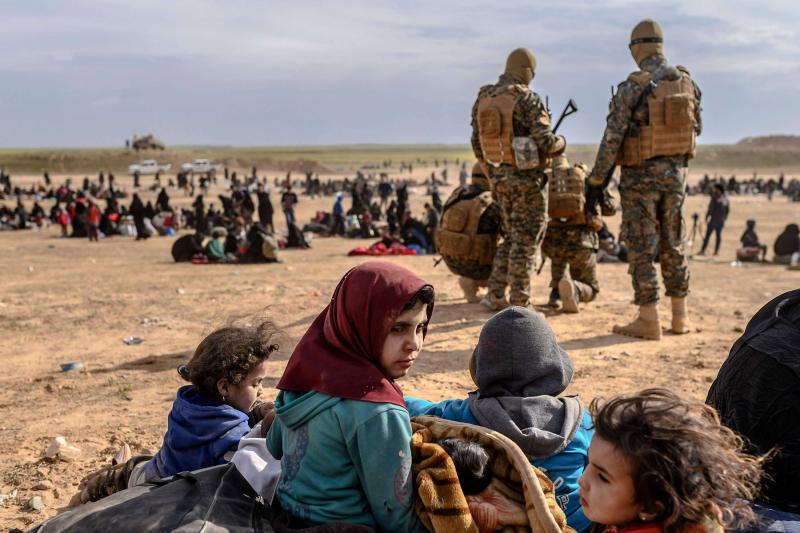After Baghouz, what do you do with ISIS families?
Baghouz, the last redoubt of the Islamic State (ISIS), may be about to fall but the real battle against the extremist group may continue for years. It will revolve around an ethically difficult and strategically important question: What to do with the families of ISIS fighters?
This is a global cohort. Women and children linked to ISIS belong to 80 countries. A report by the International Centre for the Study of Radicalisation (ICSR) in London said “41,490 international citizens” became affiliated with ISIS in Iraq and Syria; 4,761 of those were women and 4,640 were children.
The ICSR report, by Joana Cook and Gina Vale, is said to be the first global dataset of its scope and detail on ISIS. In February, the UN Security Council’s Counter-Terrorism Committee Executive Directorate used the ICSR data to argue for an urgent and considered international approach to the women who linked up with ISIS.
What might that be, given the revulsion, distrust and fear that mark attitudes towards individuals who joined ISIS?
Much of the public debate about the families of ISIS fighters has focused on Shamima Begum, the teenager who left Britain in 2015 for the caliphate established by ISIS. Begum was stripped of UK citizenship in February.
Her newborn son, Jarrah, died March 7 in a Syrian refugee camp, raising anguished questions in the United Kingdom about the right way to deal with defeated ISIS fighters and their wives and children. Begum’s son was British by birth.
As it turns out, Begum was not the only British woman whose citizenship was revoked for joining ISIS. The same thing happened some years ago with two sisters, who were, like Begum, from London. The sisters reportedly live in a refugee camp in Syria and have five children between them.
Those seven people — and Begum — are among thousands of foreign women and children with links to ISIS. Cook, whose book “A Woman’s Place: US Counterterrorism Since 9/11″ is due out in June, said the Western world must recognise a basic fact — it cannot just wish these women and their children away; they are a reality and have to be dealt with.
Cook told The Arab Weekly that leaving ISIS-affiliated women in Syria could become a concern for the next generation.
“A number of these women remain radicalised,” she said, “while others may be traumatised by their time and experience with the group. During their time with ISIS many of them have also had multiple children. By not bringing them back to their home nations and dealing with them in the most appropriate fashion — whether prosecution, deradicalisation or others deemed appropriate on a case-by-case basis — they are likely to remain in their current state and influence their children in a similar fashion.”
Children born or raised from infancy in ISIS-held territory are of particular concern. “At least 566 minors were born to at least one Western European parent,” said Cook. “These children, many whose only identity has been that affiliated with ISIS, are thus primed for future extremism or other anti-social behaviour.
“These children are largely victims and demand our assistance as citizens of our states and they are best supported in their home countries. Their future prospects currently rest in our hands.”
The alternative, Cook and others predict, is dire. From 2014, the peak of its recruitment drive, ISIS lured Westerners and others to its caliphate by suggesting European and American Muslims were never properly deemed to belong to their home countries. Stripping citizenship and refusing responsibility for ISIS-affiliated people merely substantiate the extremist group’s propaganda. It creates a problem that will continue, as Cook said, for the next generation.
In 2015, US President Barack Obama described the US-led campaign against ISIS as a “generational struggle.” He said “ideologies are not defeated by guns. They’re defeated with better ideas — a more attractive and more compelling vision.”
One of the better ideas must be an acceptance that rule of law must apply to ISIS-affiliated people. This means an acceptance by Western nations of citizens who fought for ISIS. They could prosecute them or work to de-radicalise them, as appropriate.
However, to simply abandon them in conflict zones, such as Syria, would be a monumental mistake. The Security Council report said this risks “overburdening judicial capacities and detention facilities.” Additionally, said the report, the handling of the women “who lived in [ISIS-occupied] territory… will have important implications.”
The implications are far-reaching. A principled response would be the best, most pragmatic option.
Rashmee Roshan Lall is a regular columnist for The Arab Weekly. She blogs at www.rashmee.com and is on Twitter @rashmeerl
This article was originally published in The Arab Weekly.







